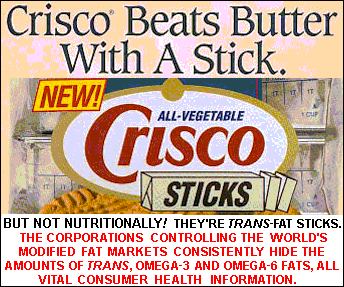[Diabetes & Weight] [Where] [Cholesterol] [Why] [More on Causes] [31 Tips & Info] [Index]
Avoid or use in moderation the foods below: |
| FOODSTUFF | AMOUNT | WHY AVOID | ||
Solid fats --from land animals
|
|
Zero
fiber, vitamins* or essential oils.
They compete with the good oils for nutrients and do slow down some essential
cell functions, yet are part of others.
To absorb these mainly land-animal fats, we increase our production of cholesterol to make bile. Its re-intake from the bowel (if we lack vitamin C and fiber) is what raises blood cholesterol, especially the LDL type that becomes 'bad' when oxidized (and if we lack vitamins). | ||
Trans (partially** hydrogenated) & most deep fry oils.
Sorry: 99% of commercial fries [see end of page] and 90% of chips, shortenings and
margarines.
|
There's
no nutritional excuse to hydrogenate anything -and many reasons not to [NEJM;
'99-6-24]
|
Factory-made hardened oils. Made from, and interfere with, the "vitamin F"
omega-3 (and omega-6) oils. They also lower good and
raise bad cholesterol. In nearly all store-bought
baked goods made with shortening.
About 40% of the fat in U.S. & Canadian donuts, fries, store-bought cookies, crackers and margarines is trans. 1 donut + 1 fries = 10 g (0.4 oz) of toxic-trans. Butter is better than just about any margarine for several nutritional reasons [also in Europe]. Most research focuses on the danger of trans fats but not on the fact that trans is made from what was once called vitamin F, first and foremost of omega-3s. | ||
"Vegetable"
oil: corn, sunflower or undefined industrial types. The "white" -factory
denatured- oils.
|
| High
intakes of refined omega-6 oils like soy, corn, sunflower, safflower, linola and cottonseed
generate too much of one class of hormones. This can cause irregular
heart rhythm, cramps and other health problems. Limited Unhydrogenated soy
does little harm since it also has some omega-3. A new reduced omega-3 cross-breed Soyola may soon make soy as important to avoid as Linola.
If it simply says "vegetable" oil, assume it's hydrogenated, too low in micro-nutrients or too high in omega-6 polyunsaturates for good health! |
||
| Flour (white - refined) and flour-made pasta. The more finely ground the flour and the more boiled [less al dente] the noodle, the higher the "glycemic index" ... not a healthy thing. |
|
They
lack essential nutrients, even after partial enrichment and are proven
inferior to whole grain products. They are linked to increased
heart disease [9-'99: The Nurses' Study]. Their rapid
absorption causes fast changes in sugar/insulin balance -and eventually cell resistance to both = adult diabetes [100 million cases world wide, 15 of 16 of which are adult type]. Commercial semolina-based pasta is low glycemic but has about as much fiber as chocolate or beer. Dried egg noodles have dangerous oxidized cholesterol (Italian research). |
||
| White rice -the more "whole", the better. |
|
Use the nutritionally superior and good-for-the-heart brown (whole) rice. Deficiencies in white rice lead to the discovery of B vitamins. P.S. Like starchy potatoes, also high glycemic index. | ||
| Sugar
White, brown, "glucose-fructose", molasses***, corn syrup & most soft drinks |
| The fructose half of sugar is a building block for cholesterol [and is a "gluey" molecule in your blood stream]. Zero fiber, vitamins or minerals. See Flour. Ironically, betaine, removed from sugar beet, is a magic key in lowering bad-for-the-heart homocysteine. ***Blackstrap molasses (especially) is a good source of calcium, magnesium, potassium and some B vitamins but it remains essentially sugar. | ||
| Dairy
Not everyone puts it in the avoid group but it's a food with complications: NotDairy.com. |
75% of the world's population has problems digesting cow's milk.
Aged cheese has oxidized cholesterol --as do powdered eggs and dried or aged meat.
Fat free yogurt is probably healthy. Young low-processed cheeses and yogurts -Indian curd and the like- are probably healthy foods for most of us.
Oct. 24th, 2009
|
[Diabetes & Weight] [Where] [Cholesterol] [Why] [More on Causes] [31 Tips & Info] [Index]
 Not only do they destroy the nutrient, they make it toxic! This double effect makes hydrogenation so detrimental: the nicotine spiking scandal of the food processing world, and probably even more deadly than its sister in the cigarette industry [some scientist should publish on this issue].
Not only do they destroy the nutrient, they make it toxic! This double effect makes hydrogenation so detrimental: the nicotine spiking scandal of the food processing world, and probably even more deadly than its sister in the cigarette industry [some scientist should publish on this issue].
